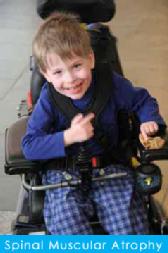Experiential knowledge, reproductive decision making and genetic risk - families living with spinal muscular atrophy
Background
Developments in genetic and reproductive medicine throughout the latter half of the twentieth century have had a significant influence on the reproductive choices available to prospective parents. Advancements in screening and testing technologies and the development of procedures such as pre-implantation genetic diagnosis (PGD) have altered the number and nature of reproductive decisions presented to prospective parents, and these options appear set to increase.
Whilst most of the research around the use of both prenatal testing and screening technologies has focused on the standard screening/testing practices for conditions which are routinely tested for eg Down’s syndrome, far less attention has been paid to the reproductive decisions made within families affected by a known inheritable condition. However there has been little cross-referencing of the literature on experiences of genetic disabilities within families and genetic/prenatal testing decisions. Indeed the importance of ‘experiential knowledge’, that is knowledge derived from direct or indirect experience with a given disability within families, appears to have a significant influence on the way in which reproductive decisions are made.
Findings and Results
The Mildred Blaxter Post-doctoral Fellowship is being used to disseminate the findings of Dr Felicity Boardman's ESRC-funded doctoral research; a study that reported on 59 in-depth qualitative interviews with people diagnosed with, or from families affected by, spinal muscular atrophy, a genetic condition of varying severities. The research focused on attitudes towards, and actual uses of, prenatal testing, carrier testing and selective termination decisions within these families, in order to explore the families’ experiences of spinal muscular atrophy - and the role their experiential knowledge played in the decisions they made in relation to spinal muscular atrophy.
Papers will be produced which will focus on:
- Conceptual definitions of disability, impairment and illness in the context of reproductive decision-making
- The role of the ‘expressivist objection’ to prenatal testing and selective termination within families affected by spinal muscular atrophy
- The value families living with spinal muscular atrophy place on experiential knowledge in prenatal testing decisions and the social, ethical - as well as practical - implications associated with making this type of knowledge available to prospective parents approaching reproductive screening decisions for other conditions, potentially unknown to them
In addition to academic papers, dissemination work will be undertaken with the Jennifer Trust for Spinal Muscular Atrophy (the major charity for families living with spinal muscular atrophy in the UK), through which participants were recruited into the research. Dissemination strategies will include the production of talks and information leaflets for Trust members on the findings and implications of the research.
Summary of findings and results


